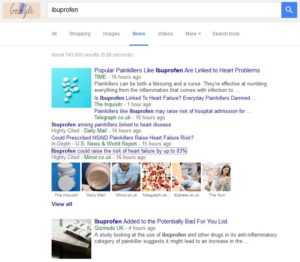The internets were ablaze this morning with a potentially very important result from a large clinical trial… ibuprofen might cause heart attack! Here’s a snapshot of the Google News page for the story…
There are multitide of things wrong with these headlines:
(1) Very few of the news outlets even bother to report which journal the study is published in. If you’re a science reporter worth your salt, FFS at least tell the public where to go to find out more!
(2) For those outlets that did list the source, the UK’s Daily Mail got it wrong, claiming it was published in BMJ Open, rather than the actual venue, the BMJ. Some got the journal correct but didn’t actually provide a hyper-link to the paper. Time got the journal correct, and provided a link, but it was a dead link! (they linked to the wrong issue of the journal).
(3) The end point measured in the study was Heart Failure. I would hope it’s not necessary to explain that heart attack and heart failure are not the same thing! Heart attack is an acute (short term) phenomenon, involving blockage of coronary arteries starving the heart of oxygen and causing it to stop functioning. Heart failure is a progressive long-term condition that involves structural changes to the heart muscle, resulting in impaired heart function. When reporters use phrases like “trigger heart problems”, implying short-term effects, it’s clear they mean heart attack, and don’t understand the distinction from heart failure.
(4) Aside from the crappy proof-reading and journalistic incompetence listed above, there’s the problem of what the study actually measured, and reported, and as usual there seems to be some conflation of cause-and-effect with correlation here…
Here’s what was actually done…The authors of the study (here’s an actual working link to it) asked a bunch of people whether they’d taken NSAIDs (non-steroidal anti-inflammatory drugs), then stratified them into 2 groups – those who had done so within the past couple of weeks, and those who had done so more than 6 months ago. They then looked at how many of those people were admitted to hospital with heart failure. What they found, is that about 20% more people in the recent NSAID group ended up in hospital for heart failure.
THIS DOES NOT MEAN NSAIDS CAUSE HEART FAILURE !!!
What it means, is there’s a very slight positive correlation between being admitted to hospital for heart failure, and having taken an NSAID in the past couple of weeks.
Firstly, there are a whole bunch of problems with one of the things being measured… namely, being admitted to hospital for heart failure may not actually mean you have heart failure. It’s a pretty wide diagnostic spectrum to begin with (several different scales available from the different interested bodies, NYHA, BHF, AHA etc.), and of course there’s the possiblity that the patients may not have actually ended up being diagnosed with true structural HF at all.
Secondly, it’s important to emphasize that the 2 things (HF hospitalization & NSAID use) correlate, but it is not possible to say which one of the two was causative! In particular, there’s no way to exclude that the people who took NSAIDS did so BECAUSE they were suffering from heart failure !!!
What does heart failure do to a person? Well, generally, it results in shortness of breath and the inability to get around, get up stairs, walk long distances, etc. As a result, such persons would be expected to be more sedentary. Well guess what happens if you don’t exercise or move around… aches and pains! And what do most people do when they have aches or pains? Pop an NSAID!
There is a very real possibility that people may have been taking more NSAIDs because they had heart failure. This could be why HF and NSAID use are correlated. Of course, sick people popping more pain med’s doesn’t make for such attractive, attention-grabbing headlines as “drugs do bad things”.
There’s also the problem that many NSAIDs are contra-indicated for use in patients taking many popular high blood pressure medications (ACE inhibitors, ARBs, beta blockers, etc). High blood pressure is one of the leading (if not THE leading) risk factors for heart failure. So, it might be expected that at least some of the patients in the study who went into hospital for heart failure had high blood pressure and were taking anti-hypertensive medications. Given the already widely-known ability of NSAIDs to do bad things in patients on such medications, could we simply be looking at a re-statement of a well-known drug interaction result here? By choosing HF as an end point, did the authors accidentally select for patients who are on drugs that NSAIDs interact badly with?
Either way, it’s clear we have a long way to go, to educate science journalists to avoid this continued sensationalism in their reporting. Maybe NSAIDs do cause heart failure, but this study doesn’t actually prove that point.

